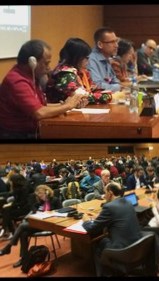Geneva hosted its 4th Annual Forum on Business and Human Rights, at the UN, from November 16th to 18th, 2015. The meeting brings together civil society, governments, NGOs, and the business sector to discuss global standards for addressing business activities’ negative impacts on human rights.
Along with NGO partners ESCR-Net, FIDH, Friends of the Earth Europe, IBFAN, and Al-Haq, Franciscans International hosted a discussion at the UN in Geneva to offer a platform for members of civil society to share their experiences and give recommendations for a legally binding treaty on business and human rights. Speakers from different regions of the world all gave examples of specific situations in which serious human rights abuses had been perpetrated by corporations, with no access to remedy for the victims. From the killing, in complete impunity, of an entire family for opposing a gold and copper mine in the Philippines, to companies establishing themselves in illegal settlements in Palestine with no direct liability, to corporations not being held legally accountable for truthful reporting in Switzerland; the stories from civil society all pointed to three conclusions: 1) a legally-binding treaty is indeed necessary, as is demonstrated by the continued shortcomings of mere voluntary measures; 2) the treaty needs to include extra-territoriality, access to remedy, and direct liability, and 3) the treaty needs to apply to all corporations, not just transnational ones.
The representative of the mission of Ecuador, one of the States sponsoring the process towards a treaty on business and human rights, concluded the event by challenging the audience and civil society to take this unique opportunity to contribute to a legally binding treaty on business and human rights, reminding them that “they were in fact building history.”
The event allowed for people from every sector – States, the business sector, and international NGOs – to hear stories on why this treaty is a necessity, and encouraged them to take into account local, well-researched perspectives on what judicial areas the treaty needs to cover.
Context:
For the past four years, since the Guiding Principles on Business and Human Rights were endorsed by the UN, Franciscans International and a vast coalition of other NGOs have been seeking to convince decision makers that the Guiding Principles are not enough to effectively address human rights abuses because they are only voluntary measures. The campaigning successfully lead to the Human Rights Council adopting a resolution in June 2014, that put a working group into place to develop a legally binding treaty to hold business accountable to upholding human rights. As the working group begins its work on developing a Treaty, FI is seeking to ensure that the voices of civil society and of those most marginalised and affected by the adverse effects of corporations are taken into account.

